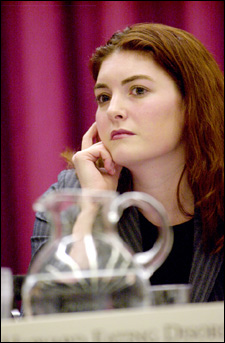‘Sopranos’ actress shares eating disorder recovery:
Girls’ image problems transcend just body image

A beautiful young actress and a teen magazine with articles like “Get cute hair in minutes” put a fresh, surprising face on the subject of eating disorders at a panel discussion Monday night (Feb. 24) at the Harvard Graduate School of Education.
Jamie-Lynn Sigler, the actress who plays Meadow on “The Sopranos” and the spokesperson for the National Eating Disorders Association, joined Abby Gardner, beauty director for YM Magazine, and Rachel Simmons, author of “Odd Girl Out: The Hidden Culture of Aggression in Girls” at the Harvard Eating Disorders Center’s annual public forum, called “Body Image, Culture & the Media: Shaping the Women of Tomorrow.” WCVB-Channel 5 anchor Liz Brunner hosted.
“I’m not over my eating disorder,” Sigler told the largely female audience. “I deal with it every day. It’s like a scar. It’s always going to be with me, especially because of my job.”
Sigler, who chronicled her battle with exercise bulimia in her book “Wise Girl: What I’ve Learned From Life, Love, and Loss,” shared her struggle, occasionally choking back tears.
Now 21, Sigler began singing, acting, and dancing in her Long Island hometown as a young girl and was cast in the pilot of “The Sopranos” when she was 15 years old. A breakup with her boyfriend in her junior year of high school, between shooting the pilot and the first season of “The Sopranos,” triggered Sigler’s slide into an eating disorder.
What began as a “really innocent” attempt to shed a few pounds with exercise and limiting desserts “snowballed into exercising four hours before school, on top of my seven dance classes a week, and eating 300 to 400 calories a day,” she said. The pounds fell off her, her hair fell out, her eyes sunk in, and her bones showed.
“I hated the way I looked,” she said. “I was so sickly and gross but I couldn’t stop my lifestyle.”

Admitting sickness, moving toward recovery
Sigler’s recovery began when she admitted – first to herself, then to her family, then to a team of therapists and nutritionists – that she wanted help. When she returned to shoot the first season of “The Sopranos,” she was just a few pounds heavier than her lowest weight. The show’s producers told her that if she didn’t gain weight in three weeks, she would be recast.
To keep the job she loved, Sigler turned to food with a vengeance. “I definitely overcompensated a little,” she said, adding that she looked like a completely different girl in the final episodes of that first season. Still, she was happy and the show’s executives were satisfied with her weight.
“The show takes place in an Italian household where everyone eats ziti every night,” she shrugged.
Fans were less forgiving, however, and negative chatter about Sigler’s weight on the show’s Web site sparked her to speak out publicly about her eating disorder.
While her career places unique demands on her physical appearance, Sigler is committed to remaining healthy and happy – and to using her public persona to inspire others.
“This is my mission now. This is what I’ve got to do. I’ve got to make something good out of bad,” she said. “It’s one of the most empowering, uplifting, rewarding experiences I’ve ever had in my life, to know that you can touch people and make a difference in their lives just by letting them know they’re not alone.”
Fashion and boys, but no diet tips
Representing exactly the type of media often damned with creating girls’ unrealistic expectations of their bodies, Abby Gardner, beauty director of YM Magazine, discussed how her publication is attempting to portray a wider range of beautiful shapes and sizes.
Targeted to girls between the ages of 13 and 19, YM offers a frothy mix of fashion and fun, beauty and boys (“The 10 Hottest TV Guys” is the cover story of the March issue). What YM readers won’t find, decided new editor Christina Kelly recently, are diet stories and weight-loss tips.

“She and all our staff really believe that young women’s heads are so cluttered with so much noise about weight and body image and how they’re supposed to look,” said Gardner.
The magazine also endeavors to use models who look more like real girls, representing a range of sizes and ethnicities. Such editorial decisions have won praise from girls and their parents with no negative impact on advertising, she said.
Rachel Simmons’ brief overview of girls’ aggression provided the evening’s most intellectually weighty topic, as Simmons drew connections between girls’ indirect expression of aggression and eating disorders.
Researching her book “Odd Girl Out,” Simmons asked girls to describe their ideal girl. The three most common attributes, she said, were “skinny,” “pretty,” and “nice.”
It’s the “nice” ideal, not “skinny,” that struck Simmons the strongest.
“For girls, particularly middle-class girls, being nice, not getting in fights with your friends and having your relationships be free of conflict was one of the most important things to them,” said Simmons. “As a result, the anger, the negative feelings, the feelings of annoyance and upset … that girls get when they hang out 27 hours a day with each other were all driven underground.”
“Odd Girl Out” explores this culture of indirect aggression, which, Simmons lamented, is not treated with the same gravity in girls as it is in boys. Yet its manifestations range from expressing anger in ways that are hurtful to others or one’s own development – insults tagged with “just kidding” or “no offense,” for instance – to feeling victimized.
The latter, she said, leaves girls feeling out of control. Eating disorders, which are about gaining control, can result.
“We live in a culture that forces on girls a beauty ideal that is nearly impossible to attain,” said Simmons, adding that the culture also does not allow girls to express the anger, jealousy, or competition that may arise from these expectations. “Those feelings end up eroding relationships from the inside and often exploding and terminating friendships that otherwise might be saved by some open conversation.”




